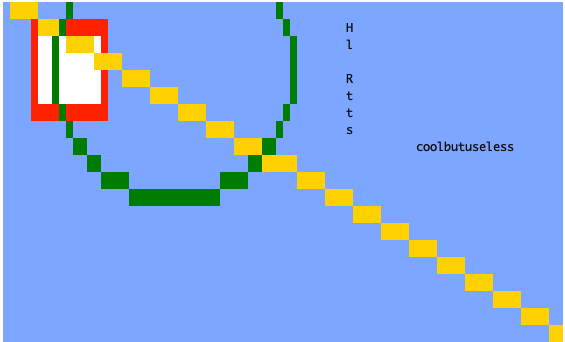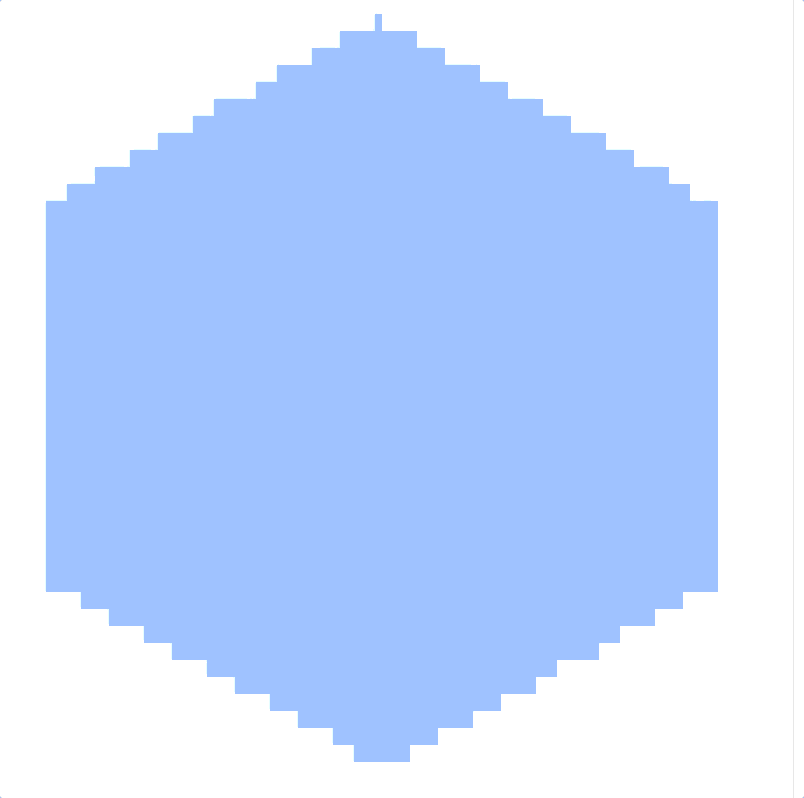miniansi 


miniansi is a package for creating simple ANSI documents.
miniansi is an R package for creating coloured ANSI output.
miniansi currently has quite a minimal feature set, as only enough was included
such that it could act as a graphics output device for R.
Installation
You can install from GitHub with:
# install.packages("remotes")
remotes::install_github("coolbutuseless/miniansi")Future possibilities
- Slice documents, copy one document into another
- Image/raster support
- Manually simulate alpha blending by tinting colours
- Anti-aliasing
- Figlet support
Simple example of creating an ANSI document
library(miniansi)
doc <- ANSI$new(width = 80, height = 20, background = 'cornflowerblue')
doc$rect(5, 5, 15, 15, colour = 'red', fill = 'white')
doc$line(1, 1, 80, 20, 'gold')
doc$circle(25, 10, r = 17, colour = 'darkgreen', fill = NA)
doc$text(50, 5, "Hello #RStats" , angle = 90, colour = 'brown')
doc$text(60, 20, "coolbutuseless", angle = 0)
doc
Aspect ratio tweaks
Working with ANSI is often painful due to the fundamental pixel unit not being square.
miniansi includes a mode which lets you specify the aspect ratio of the font,
and tries to adjust everything else (by scaling the y values) so that square
things still look square.
Use the font_aspect argument during initialisation to let miniansi know
how to compensate for aspect ratio.
This mode has its own problems (as evidenced in the plot below). Note:
The Good:
- The
rectsides now actually look (nearly) the same length
The Bad:
- Even though the document is only nominally 20 characters high, because of the
y-coord adjustment, the visible plotting area is larger i.e.
doc$max_height = height/font_aspect - Vertical text writing will never work properly in this mode.
The Weird:
- Circles are always fudged by
miniansito look circular. This was a deliberate choice in order to work sanely withgridgraphics andggplot2::geom_point
library(miniansi)
doc <- ANSI$new(width = 80, height = 20, background = 'cornflowerblue', font_aspect = 0.45)
max_height <- doc$max_height
doc$rect(5, 5, 15, 15, colour = 'red', fill = 'white')
doc$line(1, 1, 80, max_height, 'gold')
doc$circle(25, 10, r = 17, colour = 'darkgreen', fill = NA)
doc$text(50, 5, "Hello #RStats" , angle = 90, colour = 'black')
doc$text(60, 20, "coolbutuseless", angle = 0)
doc
Alternate logo - Rendering a vector font to ANSI
library(dplyr)
library(hershey) # Hershey Vector Fonts: https://github.com/coolbutuseless/hershey
#~~~~~~~~~~~~~~~~~~~~~~~~~~~~~~~~~~~~~~~~~~~~~~~~~~~~~~~~~~~~~~~~~~~~~~~~~~~~~
# Initialise a document
#~~~~~~~~~~~~~~~~~~~~~~~~~~~~~~~~~~~~~~~~~~~~~~~~~~~~~~~~~~~~~~~~~~~~~~~~~~~~~
doc <- ANSI$new(width = 110, height = 50, font_aspect = 0.4, background = 'white')
#~~~~~~~~~~~~~~~~~~~~~~~~~~~~~~~~~~~~~~~~~~~~~~~~~~~~~~~~~~~~~~~~~~~~~~~~~~~~~
# Set some sizes
#~~~~~~~~~~~~~~~~~~~~~~~~~~~~~~~~~~~~~~~~~~~~~~~~~~~~~~~~~~~~~~~~~~~~~~~~~~~~~
w <- 110
h <- doc$max_height
ll <- h/2.1
#~~~~~~~~~~~~~~~~~~~~~~~~~~~~~~~~~~~~~~~~~~~~~~~~~~~~~~~~~~~~~~~~~~~~~~~~~~~~~
# Set up a hexagon
#~~~~~~~~~~~~~~~~~~~~~~~~~~~~~~~~~~~~~~~~~~~~~~~~~~~~~~~~~~~~~~~~~~~~~~~~~~~~~
polygon_df <- tibble(
angle = seq(0, 2*pi, length.out = 7) + pi/6,
x = ll * cos(angle) + w/2,
y = ll * sin(angle) + h/2
)
#~~~~~~~~~~~~~~~~~~~~~~~~~~~~~~~~~~~~~~~~~~~~~~~~~~~~~~~~~~~~~~~~~~~~~~~~~~~~~
# Draw the polygon
#~~~~~~~~~~~~~~~~~~~~~~~~~~~~~~~~~~~~~~~~~~~~~~~~~~~~~~~~~~~~~~~~~~~~~~~~~~~~~
doc$polygon(polygon_df$x, polygon_df$y, fill = 'cornflowerblue', colour = 'darkblue')
#~~~~~~~~~~~~~~~~~~~~~~~~~~~~~~~~~~~~~~~~~~~~~~~~~~~~~~~~~~~~~~~~~~~~~~~~~~~~~
# Set up the letter R
#~~~~~~~~~~~~~~~~~~~~~~~~~~~~~~~~~~~~~~~~~~~~~~~~~~~~~~~~~~~~~~~~~~~~~~~~~~~~~
letter_r <- hershey::hershey %>%
filter(char == 'R', font == 'music') %>%
mutate(
x = 3.3 * x,
y = 3.3 * -y,
x = x + w/2,
y = y + h/2 + 2
)
#~~~~~~~~~~~~~~~~~~~~~~~~~~~~~~~~~~~~~~~~~~~~~~~~~~~~~~~~~~~~~~~~~~~~~~~~~~~~~
# Draw the letter
#~~~~~~~~~~~~~~~~~~~~~~~~~~~~~~~~~~~~~~~~~~~~~~~~~~~~~~~~~~~~~~~~~~~~~~~~~~~~~
letter_r %>%
group_by(stroke) %>%
group_walk(~doc$polyline(.x$x, .x$y, colour = 'darkred'))
#~~~~~~~~~~~~~~~~~~~~~~~~~~~~~~~~~~~~~~~~~~~~~~~~~~~~~~~~~~~~~~~~~~~~~~~~~~~~~
# print
#~~~~~~~~~~~~~~~~~~~~~~~~~~~~~~~~~~~~~~~~~~~~~~~~~~~~~~~~~~~~~~~~~~~~~~~~~~~~~
doc
Animation
This is a gif capture of this code running in my terminal. I definitely tweaked the frame rate up, as capturing a clean set of images in the terminal was hard.
library(miniansi)
library(dplyr)
library(hershey) # Hershey Vector Fonts: https://github.com/coolbutuseless/hershey
#~~~~~~~~~~~~~~~~~~~~~~~~~~~~~~~~~~~~~~~~~~~~~~~~~~~~~~~~~~~~~~~~~~~~~~~~~~~~~
# Set up the positions for each frame
#~~~~~~~~~~~~~~~~~~~~~~~~~~~~~~~~~~~~~~~~~~~~~~~~~~~~~~~~~~~~~~~~~~~~~~~~~~~~~
xoffs <- seq(135, -265, -10)
angles <- seq(pi/6, pi/2, length.out = length(xoffs))
#~~~~~~~~~~~~~~~~~~~~~~~~~~~~~~~~~~~~~~~~~~~~~~~~~~~~~~~~~~~~~~~~~~~~~~~~~~~~~
# Loop over all frames
#~~~~~~~~~~~~~~~~~~~~~~~~~~~~~~~~~~~~~~~~~~~~~~~~~~~~~~~~~~~~~~~~~~~~~~~~~~~~~
for (idx in seq_along(xoffs)) {
xoff <- xoffs[idx]
angle <- angles[idx]
#~~~~~~~~~~~~~~~~~~~~~~~~~~~~~~~~~~~~~~~~~~~~~~~~~~~~~~~~~~~~~~~~~~~~~~~~~~~
# Set up an ANSI document
#~~~~~~~~~~~~~~~~~~~~~~~~~~~~~~~~~~~~~~~~~~~~~~~~~~~~~~~~~~~~~~~~~~~~~~~~~~~
doc <- ANSI$new(width = 110, height = 50, font_aspect = 0.4, background = 'white')
#~~~~~~~~~~~~~~~~~~~~~~~~~~~~~~~~~~~~~~~~~~~~~~~~~~~~~~~~~~~~~~~~~~~~~~~~~~~
# Define some sizes
#~~~~~~~~~~~~~~~~~~~~~~~~~~~~~~~~~~~~~~~~~~~~~~~~~~~~~~~~~~~~~~~~~~~~~~~~~~~
w <- 110
h <- doc$max_height
ll <- h/2.3
#~~~~~~~~~~~~~~~~~~~~~~~~~~~~~~~~~~~~~~~~~~~~~~~~~~~~~~~~~~~~~~~~~~~~~~~~~~~
# draw a rotated hexagon
#~~~~~~~~~~~~~~~~~~~~~~~~~~~~~~~~~~~~~~~~~~~~~~~~~~~~~~~~~~~~~~~~~~~~~~~~~~~
polygon_df <- tibble(
angle = seq(0, 2*pi, length.out = 7) + angle,
x = ll * cos(angle) + w/2,
y = ll * sin(angle) + h/2
)
doc$polygon(polygon_df$x, polygon_df$y, fill = 'cornflowerblue', colour = NA)
#~~~~~~~~~~~~~~~~~~~~~~~~~~~~~~~~~~~~~~~~~~~~~~~~~~~~~~~~~~~~~~~~~~~~~~~~~~~
# Create a word in the hershey 'meteorology' font
#~~~~~~~~~~~~~~~~~~~~~~~~~~~~~~~~~~~~~~~~~~~~~~~~~~~~~~~~~~~~~~~~~~~~~~~~~~~
rstats <- hershey::create_string_df("RStats", font = 'meteorology') %>%
mutate(
x = 3 * x,
y = 3 * -y,
y = y + h/2,
x = x + xoff # (-2*w-45), w+25 => -265, 135
)
#~~~~~~~~~~~~~~~~~~~~~~~~~~~~~~~~~~~~~~~~~~~~~~~~~~~~~~~~~~~~~~~~~~~~~~~~~~~
# Draw the word using polylines for each stroke for each character
#~~~~~~~~~~~~~~~~~~~~~~~~~~~~~~~~~~~~~~~~~~~~~~~~~~~~~~~~~~~~~~~~~~~~~~~~~~~
rstats %>%
group_by(char_idx, stroke) %>%
group_walk(~doc$polyline(.x$x, .x$y, colour = 'darkred'))
#~~~~~~~~~~~~~~~~~~~~~~~~~~~~~~~~~~~~~~~~~~~~~~~~~~~~~~~~~~~~~~~~~~~~~~~~~~~
# Print the frame, reset the cursor to top of screen for a slightly
# cleaner render
#~~~~~~~~~~~~~~~~~~~~~~~~~~~~~~~~~~~~~~~~~~~~~~~~~~~~~~~~~~~~~~~~~~~~~~~~~~~
print(doc)
cat("\033[0;0H")
Sys.sleep(0.2)
}